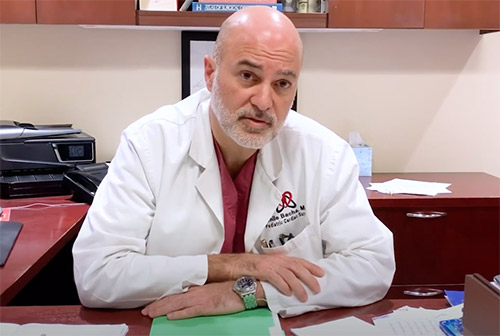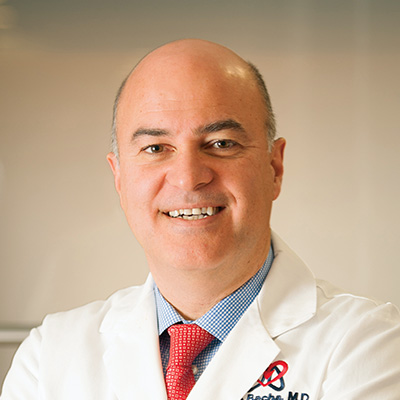A study by clinicians and surgeons in the Divisions of Pediatric Cardiology, Congenital and Pediatric Cardiac Surgery, and Neonatology at NewYork-Presbyterian Morgan Stanley Children’s Hospital and Columbia evaluated the impact of a dedicated neonatal heart program on optimizing outcomes for preterm low birth weight newborns undergoing congenital heart surgery.
A cohort of more than 1,200 neonates with congenital heart disease demonstrated some of the lowest mortality and morbidity rates after cardiac surgery when managed by a dedicated, collaborative heart team of medical and nursing providers. The groundbreaking research of the Columbia team addresses the ongoing concern that outcomes for congenital heart surgery in very low weight neonates are not equivalent to the improved outcomes shown in children undergoing surgery for congenital heart disease.
“Many neonates, some weighing as little as 1.2 kilograms, require heart surgery within hours of birth,” says Emile A. Bacha, MD, Chief of Congenital and Pediatric Cardiac Surgery at NewYork-Presbyterian and the Calvin F. Barber Professor of Surgery at Columbia. “Low birth weight and premature babies compared to babies born later and at normal size have a higher rate of complications with approximately twice the mortality rate. They differ from infants and older children not just in size, but also in the physiology of their maturing organs and systems, and therefore they require unique and differentiated care. Because of the complexity of these surgeries in babies so small, many centers decline to operate on them and refer them to programs such as ours.”

Dr. Emile Bacha
In earlier research, published in the December 2020 issue of Pediatric Cardiology, Dr. Bacha, Brett R. Anderson, MD, pediatric cardiologist, Ganga Krishnamurthy, MD, Medical Director of the hospital’s Infant Cardiac Intensive Care Unit, and their Columbia colleagues reported on the possibility of added risks of performing cardiac surgery in neonates born ≤2.0 kg after accounting for the baseline risks of low birth weight. How small is too small and the risk-benefit equation of waiting for low birth-weight infants to grow before operating on their hearts have been the focus of considerable debate and questions the Columbia researchers seek to answer.
The retrospective study reviewed 105 neonates with birth weights ≤2.0 kg with hemodynamically significant congenital heart disease who had surgery at NewYork-Presbyterian Morgan Stanley Children's Hospital between January 1, 2006 and December 31, 2016. The study showed that while surgeons continue to advance the limits of complex cardiac surgeries in low weight neonates, it is important to acknowledge that reaching the outcomes observed in the general neonatal cardiac surgical population is not a realistic target and that risks of surgery remain higher among low birth weight patients.
The team’s current research, which is pending publication, builds on these findings, looking at the impact of a dedicated neonatal cardiac program on outcomes. “The NewYork-Presbyterian pediatric heart team has achieved lower mortality and morbidity rates particularly in the very preterm and late preterm groups compared to previous reports,” says Dr. Bacha, who emphasizes the reason for this achievement lies in teamwork. “Care of these infants involves not only the surgeon’s skills, but a perfusionist with expertise in running a heart lung machine on such a small baby and a highly expert anesthesia team. You need specialists who can manage the complexities of postoperative care and recovery and a highly specialized care environment with team members who are all experts in neonatal and pediatric cardiac care to best serve their multifaceted clinical condition.”
A study in a cohort of more than 1,200 neonates with congenital heart disease who underwent surgery at NewYork-Presbyterian Morgan Stanley Children's Hospital revealed some of the lowest mortality and morbidity outcomes compared to previous reports.
Dr. Krishnamurthy, who is Medical Director of the nation’s first Infant Cardiac Intensive Care Unit, established at NewYork-Presbyterian Morgan Stanley Children’s Hospital in 2017, agrees. “Dedicated and specialized teams can really influence outcomes for the better. They can make what is generally considered a non-modifiable risk factor, modifiable,” says Dr. Krishnamurthy, who is one of the few doctors in the country with unique and rare expertise in neonatal cardiac intensive care and a pioneer in her field. “The smallest patient to undergo cardiac surgery at NewYork-Presbyterian Morgan Stanley Children’s Hospital weighed just 500 grams. By creating a unit exclusively dedicated to very low-weight newborns with congenital heart disease, we are especially adept at caring for some of the most complex and challenging cases.”

Dr. Ganga Krishnamurthy
The unit’s highly skilled team includes neonatal and pediatric cardiac intensivists, pediatric cardiologists, and neonatal and pediatric cardiac nurse practitioners. “The Infant Cardiac Intensive Care Unit offers the perfect complement to the extraordinary care our clinicians provide on a daily basis to infants with extreme prematurity, very low birth weight, and complex congenital abnormalities that may require surgery,” adds Dr. Bacha. “We believe this highly specialized care model provides the best outcomes for newborns with congenital heart disease.”
Importantly, notes Dr. Bacha, the neonatal cardiac program model embraces novel approaches that enhance the care provided to this population:
- Neonates, including those born preterm with critical congenital heart disease, are designated as a separate cohort and cared for in a dedicated unit distinct from the pediatric cardiac intensive care unit.
- All care providers have demonstrated expertise – including experience and training – in neonatal cardiac care.
- All phases of care from admission to discharge, including postoperative recovery, take place in the same location with the same team without transitions from one unit to another.
- Older infants, children, and adolescents with acquired and congenital heart disease receive care in a separate, dedicated pediatric cardiac intensive care unit by a second team.
“This is a novel field with our specialists straddling neonatal and pediatric cardiac intensive care,” says Dr. Krishnamurthy. “If you are striving for excellence, then you need a dedicated team, highly focused protocols at every point of care, and an environment that supports advances in the field. This is what we created at NewYork-Presbyterian Morgan Stanley Children’s Hospital. It has been a paradigm shift that continues to produce optimal outcomes in our tiniest patients.”





